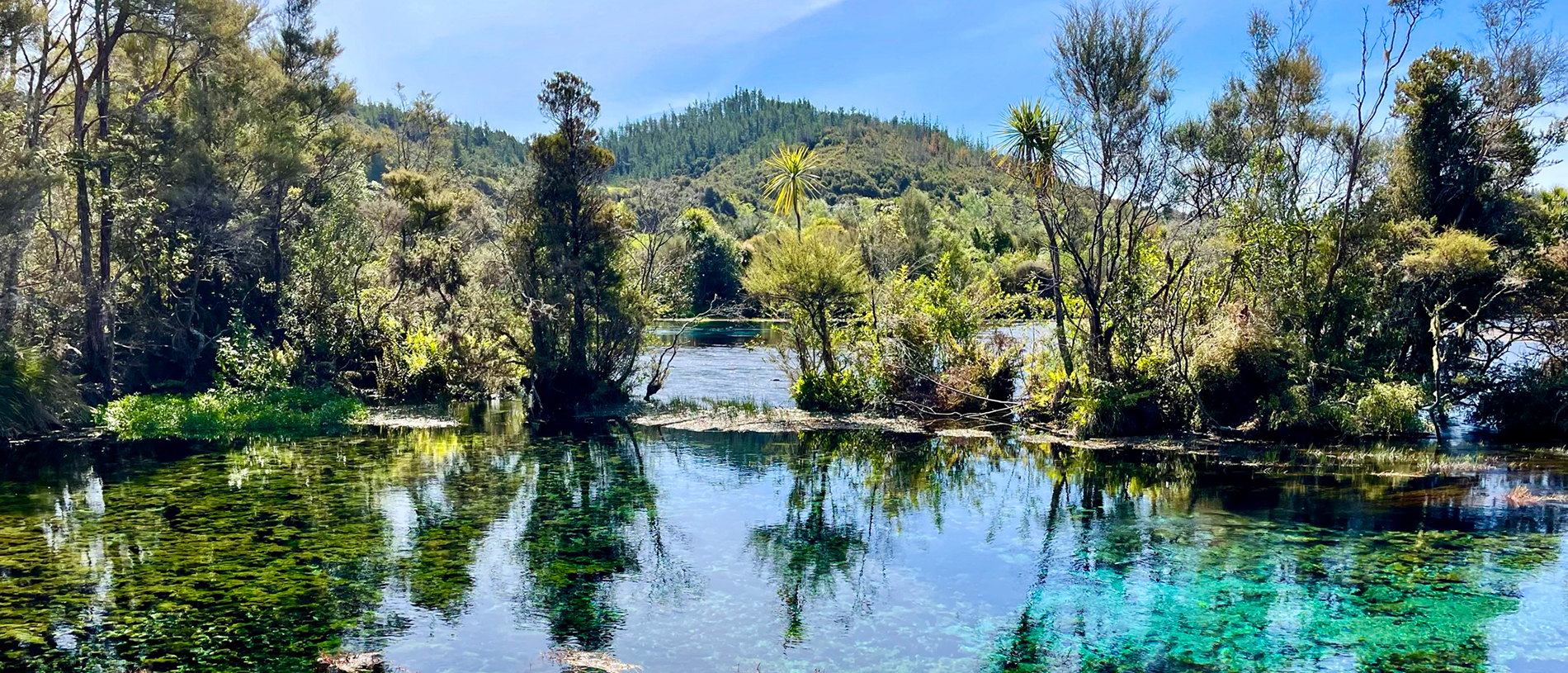
Road trip: Wellington to Golden Bay
Cross the Cook Strait to discover the top of the South Island - from artistic Nelson to gorgeous Golden Bay.
Barbara flaps her fleshy wings and, with a sharp-toothed smile, rises out of the water, pressing her writhing body against my legs. But rather than being alarmed by this very (very) close encounter with a wild stingray, I am delighted.
Standing in thigh-deep water off the coast of Tatapouri Bay, dark shadows circle around my legs. This is the up-close encounter provided by the team at Dive Tatapouri. Here, twice a day at low tide, groups of about 30 people can interact with the wild and playful stingrays that know they’re onto a good thing – coming in from the deep to be hand-fed chunks of fish.
Dressed in one of the most bizarre garments I’ve worn – olive green waders with built-in, clownishly big gumboots – Ben, my husband, Gus, our 14-year-old, and I make our way into the choppy shallows, using bamboo poles for support.

Tatapouri Bay is home to around 90 wild stingrays, although only about 20 are bold enough to visit the tour groups, our guide Nina explains. They’re all female – having driven any rogue males out of their territory. Barbara is the star of the show – a seven-year-old short-tail stingray who is as friendly as a puppy. “She loves pats,” Nina says. “Feel free to give her a rub.” I reach into the water and run my hand over her silky, slightly slimy flanks as she wriggles happily in the shallow water.
The sunny afternoon is cooled by a briny breeze. There’s something about the mix of salt spray and sunshine that cultivates a craving for fish and chips or scooped ice cream. We check out Tata Café, part of the camping and glamping precinct at Tatapouri Bay. But rather than classic ice cream, we opt for perfectly made coffee and Best Ugly bagels slathered in avocado and microgreens. Everything tastes delicious accompanied by the tang of sea air.

Later that evening we dine in the golden sunset glow at Crawford Road Kitchen adjacent to the Gisborne marina. Boats tug gently on their tethers in front of a riverbank lined by large palm trees. We tuck into shared plates of delicate fish crudo, succulent fried chicken and salads served in delicious teetering piles.
In the morning we get our bearings at the top of Kaitī Hill. Big turquoise views stretch up and down the coast, the sea enticing in the sunshine. But today we are heading inland to discover one of the East Coast’s hidden gems – Eastwoodhill, the National Arboretum of New Zealand. A tranquil oasis of green, the arboretum is home to the country’s largest collections of exotic trees, with more than 3,500 species cultivated over the last 114 years.

While there are 25 kilometres of walking trails that wind through the gardens, we opt to take a guided tour in a zippy electric golf cart with the arboretum’s expert head horticulturalist, Anthea. She tells us how the arboretum was founded by Douglas Cook in 1910. Cook converted 250 hectares of sheep farm in the Ngātapa Valley, inspired by northern hemisphere gardens he’d visited while recuperating from injuries in WWI.
Today, the arboretum is effectively a botanical ark, with many rare, endangered and nearly extinct species preserved in this little pocket of the East Coast. We learn that northern hemisphere species, like the 81 types of oak at Eastwoodhill, grow three times faster here without the cold winters. We pause in a small grove of Patula pines from Mexico and Anthea encourages us to look up and observe the phenomenon of ‘crown shyness’ – where the trees’ canopies stop a polite distance from each other.

Just up the winding country road from the arboretum is the famous Rere rockslide. We’d planned for this, bringing boogie boards and wetsuits from home, though my anticipation is mixed with a large dose of nerves. Not least due to the stretch of aggressively slippery rocks to navigate at the top of the falls.
I inch my way to the edge of the slide like an ungraceful, neoprene-clad seal, teeth gritted and then the current catches me and I’m off – faster and faster, juddering over outcrops, spray flying, until I skim and splash into the pool at the bottom. Exhilarated. And slightly battered.

Teenage Gus is in his element, picking the fastest routes down the slick rock face and learning where to position his weight to get maximum skimming distance at the bottom. I’m quite content to spectate after my sole run. No need to invite a middle-aged injury.
Back at the coast, we take stock of our day’s adventures at the newly opened Tahu – a stylish restaurant maximising its oceanfront position on the Waikanae Beach surf club balcony. Happy diners soak in the salty sunset while the waves froth down below.

It would be remiss to visit Gisborne and not experience the famous surf. So, on our last morning we meet Holly Quinn (sister of world-champion surfer, Maz) from Salt Shack Surf School for a lesson. Lying on the sand Holly shows us how to wax our boards, how to paddle and how to pop up, though I soon learn that transitioning from a prone position to a crouch on a moving surfboard is much easier said than done. Gus, of course, nails it – leaping to his feet with the spring of youth. I’m content to stick with kneeling, curving my board through the whitewash.
Salty, sandy and satisfied, we peel off our wetsuits and settle in contentedly for the drive back home.
Story by Jo Percival for the Autumn 2024 issue of AA Directions Magazine. Jo Percival is the Digital Editor of AA Directions Magazine.
